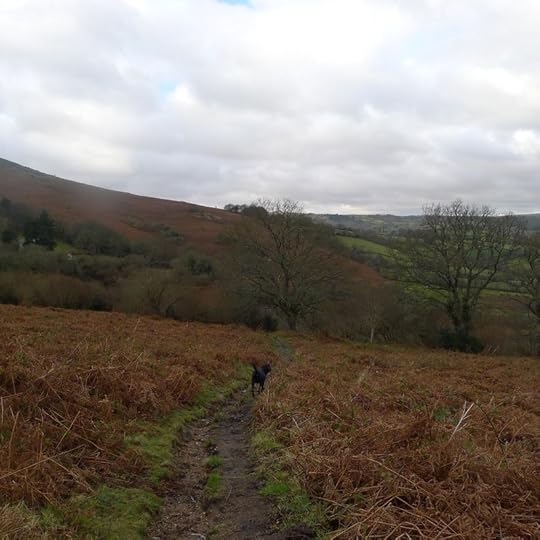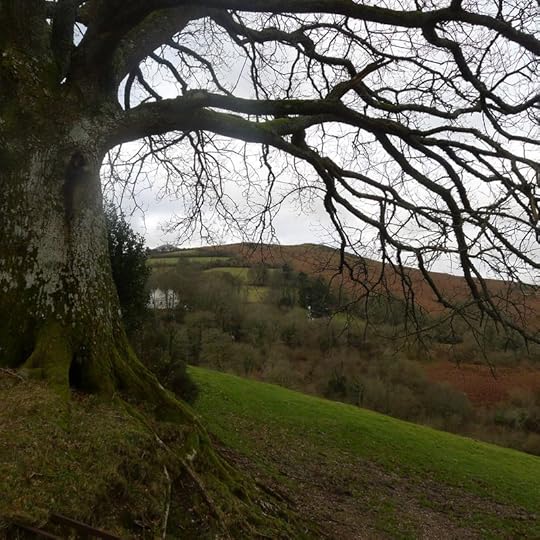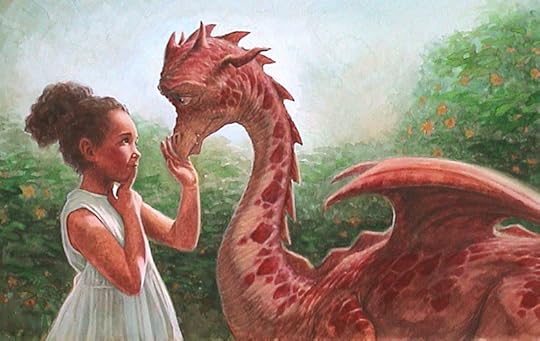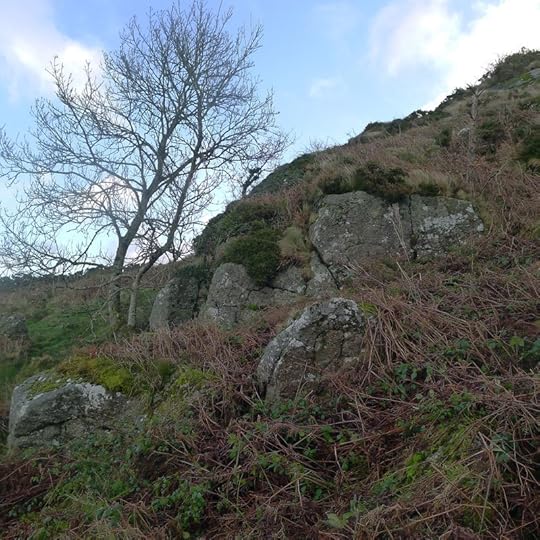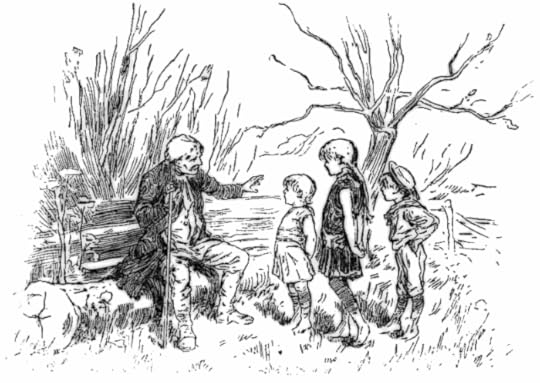Terri Windling's Blog, page 199
February 17, 2013
Tunes for a Monday Morning
Today, Italian pianist and composer Ludovico Einaudi, (with thanks to Chantal Simon for introducing me to his music). Einaudi was raised in Turin, Italy, studied at the Conservatory in Milan, and now resides on a vineyard in the Piedmont region. He's an interstitial musician who combines his classical training with a love of music from many different genres.
Above, "Walk," an exquisite song from him new album, In a Time Lapse.
Below, "In a Time Lapse story telling," a lovely video in which the composer explains the concepts behind the album.
And last:
"Divinire" (from Einaudi's 2006 album of the same name) performed in the Palazzo Te, in Mantova, Italy.
"It's only when we become aware or are reminded that our time is limited that we can channel our energy into truly living." - Ludovico Einaudi
February 9, 2013
Heading off
The quote of the day
"You don’t have to get a job that makes others feel comfortable about
what they perceive as your success. You don’t have to explain what you
plan to do with your life. You don’t have to justify your education by
demonstrating its financial rewards. You don’t have to maintain an
impeccable credit score. Anyone who expects you to do any of those
things has no sense of history or economics or science or the arts. You have to pay your electric bill. You have to be
kind. You have to give it all you've got. You have to find people who
love you truly and love them back with the same truth. But that’s all." - Cheryl Strayed (via Jonathan Carroll)
The Desire for Dragons
Today, I'd like to initiate a new Moveable Feast topic: "The Desire for Dragons."
This topic is based on some of the quotes we've been discussing this week, about why we write, or paint, or perform, or read, or simply love fantasy and mythic art. Why are we, in Mollie Hunter's words, among those "who actively retain the desire for [the sense of wonder] known in childhood"? What brought here to the numinous landscape of Faerie, and why do we stay?
The title of the Feast comes from J.R.R. Tolkien. “I desired dragons with a profound desire," he wrote regarding his life-long taste for myth and tales of magic. "Of course, I in my
timid body did not wish to have them in the neighborhood. But the world
that contained even the imagination of Fáfnir was richer and more
beautiful, at whatever the cost of peril.”
"Do people choose the art that inspires them," Alice Hoffman has asked; "do they think it over, decide they might prefer the fabulous to the real?" For Hoffman, "it was those
early readings of fairy tales that made me who I was as a reader and,
later on, as a storyteller." But what about for each of us? What draws us to the mythic arts? Why do we desire dragons?
The following posts are the first dishes for the Feast (a little tray of appetizers, perhaps): "Shaping stories, and being shaped by them," "Finding the colors again," and "Dreaming Awake."
You're welcome (as always) to bring whatever you like to the table: a piece of prose, a piece of art, a poem, a quote, etc., etc.; and you're welcome to offer more than one dish, should you be inspired to do so.
There are three ways to participate:
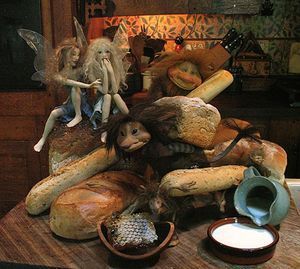 1. By posting your offering on your own blog, and then leaving a link in the Comments section of this post. (When you do, please let me know where in the world you're located. The information will be needed for this Feast's list on the Moveable Feast page.)
1. By posting your offering on your own blog, and then leaving a link in the Comments section of this post. (When you do, please let me know where in the world you're located. The information will be needed for this Feast's list on the Moveable Feast page.)
2. Those of you who don't have blogs of your own are welcome to put your contribution here, in the Comments section of this post. (But nothing exceedingly long here, please!)
3. You can also contribute to the Feast simply by joining in the conversation and responding to the various offerings--both in the Comments here and in the Comments sections of participating blogs.
If you're new to the Moveable Feast concept, visit the Feast page for
an explanation--and to see the range of offerings folks have contributed
to previous Feasts.
Now I should warn you, I'm going to be away for the next week (I'm off on a writing retreat, happily), but I welcome you, as a community, to take over the Comments section here in my absence and thus to get this Feast rolling...in fact, I'm rather counting on you to do that. I'll read everything that's posted as soon as I'm back online (Saturday, Feb 16) -- and I'll contribute a more substantial dish of my
own the following week.
Please pass word of the Feast (and an explanation of how it works) to anyone who might be interested in participating. They needn't be regular readers of this blog.
All are welcome at the table.
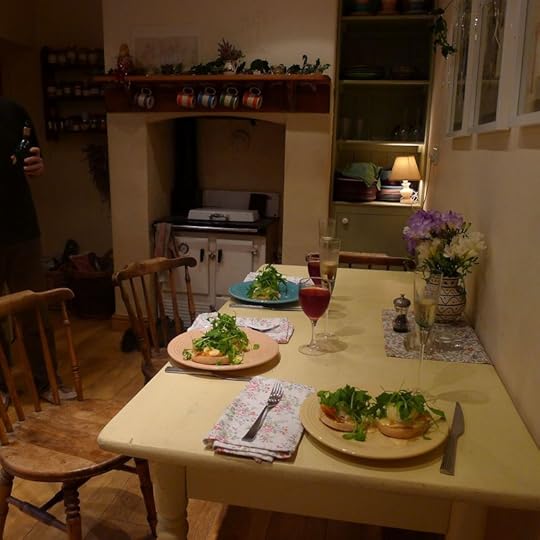 Images above: "Ignis and Cara" by the Dublin-based illustrator P.J. Lynch (from his book Ignis), "Kitchen Faeries" by Wendy Froud (photographed by Toby Froud, for a lovely article by Ari Berk), and feasting at Bumblehill.
Images above: "Ignis and Cara" by the Dublin-based illustrator P.J. Lynch (from his book Ignis), "Kitchen Faeries" by Wendy Froud (photographed by Toby Froud, for a lovely article by Ari Berk), and feasting at Bumblehill.
February 7, 2013
Words forged in earth, air, fire, and water
“[F]or adults, the world of fantasy books returns to us the great words
of power which, in order to be tamed, we have excised from our adult
vocabularies. These words are the pornography of innocence, words which
adults no longer use with other adults, and so we laugh at them and
consign them to the nursery, fear masking as cynicism. These are the
words that were forged in the earth, air, fire, and water of human
existence, and the words are: Love. Hate. Good. Evil. Courage. Honor.
Truth.” - Jane Yolen
“Nobody believes me when I say that my long book is an attempt to create
a world in which a form of language agreeable to my personal aesthetic
might seem real. But it is true.” - J.R.R. Tolkien
"Language is a bountiful gift and its usage, an elaboration of community and society, is a sacred work. Language and usage evolve over time: elements change, are reborn or forgotten, and while there are instances where transgression can become the source of an even greater wealth, this does not alter the fact that to become entitled to the liberties of playfulness or enlightened misuse of language, one must first and foremost have sworn one's total allegiance.” ― Muriel Barbery

“Language is music. Written words are musical notation. The music of a
piece of fiction establishes the way in which it is to be read, and, in
the largest sense, what it means. It is essential to remember that
characters have a music as well, a pitch and tempo, just as real people
do. To make them believable, you must always be aware of what they would
or would not say, where stresses would or would not fall.” - Marilynne Robinson
“From time to time I try to imagine this world of which he spoke--a
culture in whose mythology words might be that precious, in which words
were conceived as vessels for communications from the heart; a society
in which words are holy, and the challenge of life is based upon the
quest for gentle words, holy words, gentle truths, holy truths.
"I
try to imagine for myself a world in which the words one gives one's
children are the shell into which they shall grow, so one chooses one's
words carefully, like precious gifts, like magnificent gifts, like
magnificent inheritances, for they convey an excess of what we have
imagined, they bear gifts beyond imagination, they reveal and revisit
the wealth of history.
"How carefully, how slowly, and how
lovingly we might step into our expectations of each other in such a
world."
February 6, 2013
In the Word Wood
"I was in Japan with a novelist, a man named Kazumasa Hirai. Everywhere I've gone in the world I would ask anybody I was with, 'What do you mean when you say you're a storyteller? What does a storyteller do?' And Kazumasa San said to me, 'Your work is to take care of the spiritual
interior of the language. In Japanese the word
kotodama means that each word has within it a spiritual interior. The
word is like a vessel that carries something ineffable. And you must be
the caretaker for that. You must be careful when you use language to
look at every part of the word, and make to sure that you're showing respect
for it in the place that you've given it to live in the sentence.' " -- Barry Lopez
“I don't think writers are sacred,
but words are. They deserve respect. If you get the right ones in the
right order, you might nudge the world a little..." ― Tom Stoppard
"I believe in fiction and the power of stories because that way we
speak in tongues. We are not silenced. All of us, when in deep trauma,
find we hesitate, we stammer; there are long pauses in our speech. The
thing is stuck. We get our language back through the language of others.
We can turn to the poem. We can open the book. Somebody has been there
for us and deep-dived the words." ―
Jeanette Winterson
“…words have been all my life, all my life--this need is like the
Spider's need who carries before her a huge Burden of Silk which she
must spin out--the silk is her life, her home, her safety--her food and
drink too--and if it is attacked or pulled down, why, what can she do
but make more, spin afresh, design anew....” - A.S. Byatt
I want to see the thirst
inside the syllables
I want to touch the fire
in the sound:
I want to feel the darkness
of the cry. I want
words as rough
as virgin rocks.
- Pablo Neruda (from his poem "Verb")
 The title for this post is taken from Dave Wyatt's painting of me & Tilly, "In the Word Wood." For the latest beautiful painting in his Local Characters series, "Mariana and the Black Whippets," go here.
The title for this post is taken from Dave Wyatt's painting of me & Tilly, "In the Word Wood." For the latest beautiful painting in his Local Characters series, "Mariana and the Black Whippets," go here.
February 5, 2013
Dreaming awake
“I write fantasy because it’s there. I have no other excuse for sitting
down for several hours a day indulging my imagination. Daydreaming.
Thinking up imaginary people, impossible places. Imagination is the
golden-eyed monster that never sleeps. It must be fed; it cannot be
ignored. Making it tell the same tale over and over again makes it thin
and whining; its scales begin to fall off; its fiery breath becomes a
trickle of smoke. It is best fed by reality, an odd diet for something
nonexistent; there are few details of daily life and its broad range of
emotional context that can’t be transformed into food for the
imagination. It must be visited constantly, or else it begins to become
restless and emit strange bellows at embarrassing moments; ignoring it
only makes it grow larger and noisier. Content, it dreams awake, and
spins the fabric of tales. There is really nothing to be done with such
imagery except to use it: in writing, in art. Those who fear the
imagination condemn it: something childish, they say, something
monsterish, misbegotten. Not all of us dream awake. But those of us who
do have no choice.” - Patricia A. Mckillip
"Do people choose the art that inspires them — do they think it over, decide they might prefer the fabulous to the real? For me, it was those early readings of fairy tales that made me who I was as a reader and, later on, as a storyteller."
- Alice Hoffman
"My parents gave me C.S. Lewis and Tolkien and T.H. White, but I think I
was supposed to grow out of them. Which makes me think of that famous
China Miéville line — when people ask me how I got into fantasy, I ask
them, how did you get out of it?" - Lev Grossman (from "What Fantasy Does Best")
"People who deny the
existence of dragons are often eaten by dragons. From within." - Ursula
K. Le Guin (from The Wave in the Mind)


February 4, 2013
Finding the colors again
"We read fantasy to find the colors again, I think. To taste strong
spices, and hear the songs the sirens sang. There is something old
and true in fantasy that speaks to something deep within us, to the
child who dreamed that one day he would hunt the forests of the
night, and feast beneath the hollow hills, and find a love to last
forever, somewhere south of Oz, and north of Shangri-La.” –
George R.R. Martin
"Current cant equates fantasy with escapism, and current fashion would
have it that fantasy is both easy to read and to write. It isn't. When
it is done honestly, by a skillful writer, fantasy takes us far enough
beyond our daily perceptions to open us to the essential realities
beneath it. This is the true goal of all art."- Ellen Kushner
"All art, by definition of the word, is fantasy in the broadest sense. The most uncompromisingly (should I say sordidly?) naturalistic novel is still a manipulation of reality. Fantasy, too is a manipulation, a reshaping of reality. There is no essential conflict or contradiction between literary realism and literary fantasy, any more than between science and humanism. Technical details aside, most of the things you can say about fantasy also apply to realism. I suppose you might define realism as fantasy pretending to be true; and fantasy as reality pretending to be a dream." - Lloyd Alexander
"The world of reality has no room for wistful backward-looking; and even if it had, there are no more than a few people who actively retain the desire for [the sense of wonder] known in childhood or have the capacity to evoke it at will. These few, moreover, soon become strangers to their fellows, for they are the incomprehensible ones--the dreamers who take the sky for their skull, the ribs of mountains for their bones, who sense always the faculties of the primitive, and see always with the wondering eye of the child.
"They are the ones who never pass a secret place in the woods without a stare of curiosity for the mystery implied in all its mounds and hollow, who still turn corners with a lift of expectation at the heart. And to be a writer of fantasy, one must be among those few -- those fortunate few; for, to produce a work that answers all the demands of fantasy, is to suddenly turn the corner which does at last show something strange and wonderful waiting to be seen, and -- most gloriously -- to know that long-ago sense of yearning at last fulfilled." - Mollie Hunter
Ira Glass on storytelling
February 3, 2013
Tunes for a Monday Morning
The Civils Wars held a contest to create the official video for their song "Twenty Years," and the winning video (above) came from South Africa. The story behind the video is explained by folks who made it, the Innerview Production Company:
"Under the apartheid regime in South Africa, many Native South Africans
were dispossessed of their land and were forced to leave their families
to earn a living and pay taxes by working as cheap labour in the mines
across the country. They were banned by law from bringing wives and
children with them to the mines as they were considered 'superfluous
appendages.' Many of these families were torn apart for extended periods
of time, many died of mining related diseases, while some returned to
their families after years or even decades apart. The video
depicts a Xhosa newlywed couple whose lives are separated for economic
and political reasons as the husband leaves to work in the mines to
sustain his family financially."
It's a gorgeous little video. Makes me cry every time.
Above: "Barton Hollow," which is also by The Civil Wars (John Paul White and Joy Williams), from the album of the same name.
Below: "My First Lover" from the great folk/bluegrass duo Gillian Welch and Dave Rawlings. It's from their third CD Time (The Revelator).
And last, a real treat: footage of Welch & Rawlings in a spontaneous performance of Neil Young's beautiful song "Pochahontas."
Terri Windling's Blog
- Terri Windling's profile
- 707 followers



